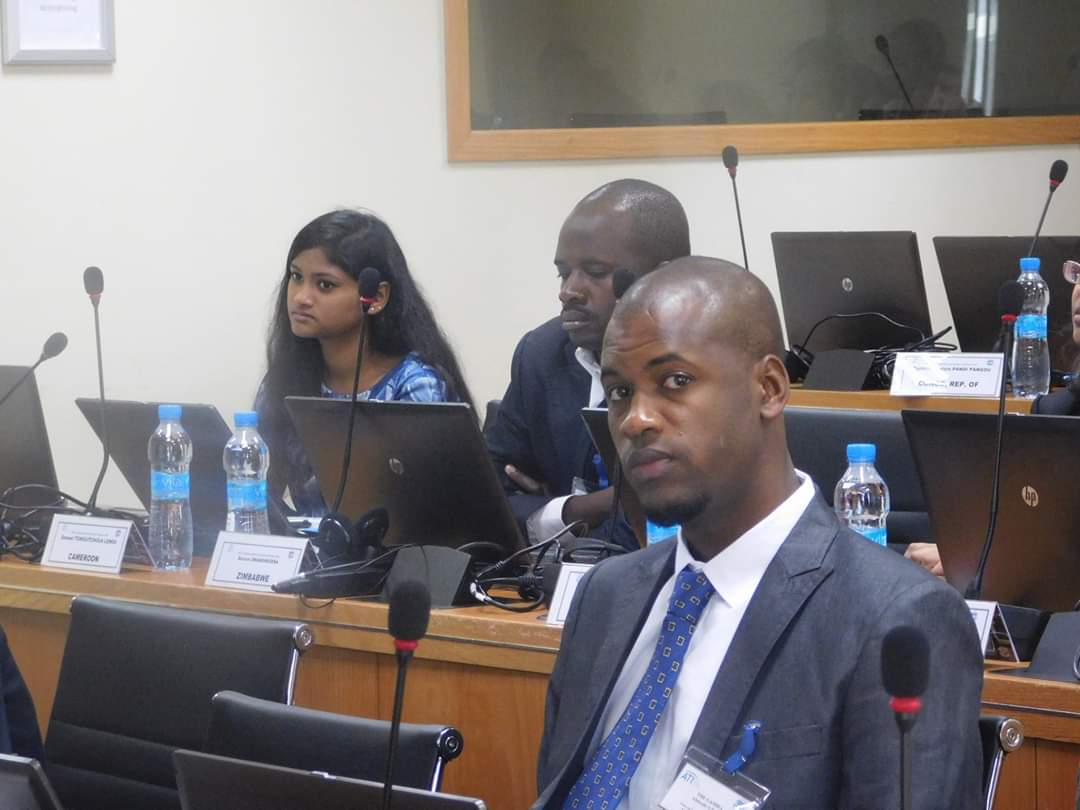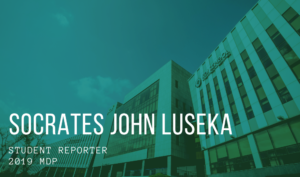
A Conversation with Mr. Abdoulie Sarjo Bah(2019 MPP): The Gambia
- Date 2021-04-02 01:51
- CategoryStory
- Hit1577
Mr. Abdoulie is a Gambian national and economist by training. At the beginning of his career, he had a stint in banking but later left to join the government. He has been in government for almost 5 years. Gentleman by mannerisms, engaging to a fault and elegant in his dress code, he is easily the first to notice in any room full of people.
 Source: https://video.wallko.us
Source: https://video.wallko.us
His country, The Gambia is the smallest country within mainland Africa and located in West Africa. It is surrounded by Senegal, except for its western coast on the Atlantic ocean. ‘Banjul’ is the Gambian capital and the country’s largest metropolitan area.
Mr. Abdoulie and I met and had the following conversation.
Tell us about yourself.
I am a Senior Economist in The Gambia’s Ministry of Finance and Economic Affairs, working at the Public Finance Management Directorate (PFM). It is over 4 years now since I started working at the ministry. I help in the coordination of on-going PFM reforms and programs.

I did my undergraduate degree in Economics & finance (minor) from the University of The Gambia. I am currently on study leave pursuing a Master of Public Policy in Finance and Macroeconomic Policy at KDI School of Public Policy and Management.
Tell us a bit about your directorate, the Public Finance Management unit (PFM).
The PFM Directorate is one of the eleven directorates that form the ministry of finance and economic affairs. As a management unit, we design public finance reform programs and give direction on how these programs ought to be coordinated and implemented. That is basically the gist of our functions even though we do much more .
Through our work, we seek to maintain fiscal discipline and bring about efficient use of public finance. We promote this by ensuring that the revenue collected and public spending thereafter are consistent with the fiscal deficit targets, and do not drag us towards unsustainable levels of public borrowing. Alongside that, we also aim to ensure that there is efficient allocation of resources and while at it work towards achieving maximum value for money in public service delivery.
Among the other directorates we work with include the budget unit, Economic Policy and Research unit, Planning unit, Macroeconomic Policy analysis unit, just to name but a few. We work harmoniously to achieve the ministry’s objectives.
Well, any sort of challenges the PFM directorate gets to meet in the course of its activities?
We do our best but like every other kind of work we face challenges. It is inevitable. Chief among them is not having sufficient resources to meet our goals. We have managed to work our way around that by working with several development partners.
I learnt that one of the crucial reforms in The Gambia’s Ministry of Finance & Economic Affairs over the last decades was the introduction of the Integrated Financial Management Information Systems (IFMIS). Tell us about that and how it has transformed the ministry’s functions.
First, allow me to elucidate the meaning of IFMIS to those who might not be familiar with the term. IFMIS is the use of ICT in financial operations to support the management and budget decisions, fiduciary responsibilities, and the preparation of financial reports and statements. In the government realm, IFMIS refers more specifically to the computerization of PFM processes, from budget preparation and execution to accounting and reporting, with the help of an integrated system for financial management of line ministries, spending agencies and other public sector operations.
The system was introduced into the ministry around 2006/2007. Since then, the changes have been tremendous. It has brought about timeliness and completeness in financial reporting, improved the budgeting reports for both the revenue and expenditures, and enhanced transparency in the use of government funds through timely posting of monthly and quarterly public expenditures on the ministry’s website (in full view of the public eye). That said, it has had its own challenges. For instance, it cannot capture all transactions. Transactions made by Embassies and agencies located away from the system fail to feature. Since the system is not web-based, that explains why.
You have attended a number of capacity building programs, in and out of your country. From what you got in these programs, how important do you think capacity building is to any given workforce? Name any two or three of those that stood out for you and describe how impactful they turned out to be.
Capacity building is crucial to any given workforce. There is always something to learn from people with other experiences, the need to stay updated on the emerging trends and technologies in your industry, among other things. Learning never stops and I think capacity building helps one to stay on that learning curve. In order to have an efficient and effective workforce, capacity building programs ought to be considered.
Moving on to the second part of your question, yes I have attended a number of programs around the globe; some out of my own volition and others as arranged by the ministry. The two IMF programs I attended in Mauritius stood out. They gave me a great understanding on how to use quantitative techniques to analyze macroeconomic data using different empirical models, and how to use the results to interpret and forecast macroeconomic issues.
A course at Kasetsart University in Thailand on SMEs gave me a lot of insight and accelerated the interest and passion I have for entrepreneurship.
The Young African Leadership Initiative (YALI) training in Ghana, holds a special place in my heart. YALI, a program that was initiated by former US President, Barack Obama, aims to educate and train young people in Africa on leadership, entrepreneurship, civil society and public policy management. In 2018 I took part in one (in Ghana) and was fortunate to be meet 139 exceptionally talented youths from 9 countries. The lessons I acquired from that program have been a moral and ethical compass, guiding my everyday decisions and work. To that, I’ll forever be grateful.
Well, I have attended many other capacity building programs and collectively they have groomed me into a better person.
I must say you’re one focused guy who is quite passionate about his work. What is this about your job that keeps you going?
Mmhhh, what keeps me going? You got me on that (chuckles..). I cannot bottle up the fulfillment that comes with serving my own people and contributing to the development of my country. The joy I get from this is everything. It fuels me daily. Also considering that my academic background is in economics and finance, I get to put to practice all the theoretical knowledge in my head. That in itself is interesting. Economics is a very fascinating discipline. I guess I am a living epitome of the quote, ‘do what you love and you will never work a day in your life.’
Briefly take our audience through the Gambian Economy.
Agriculture, industry and services are the key sectors that make up our GDP, contributing 22%,17% and 61% respectively. GDP growth has been quite volatile over the past few years fluctuating between 4.01% and 6.5 % from 2015 to 2018. In 2016 it dipped to 1.9 % thanks to the political tension around that time. At the moment, just like many other countries, our economy is taking a hit from COVID-19 which might possibly plummet the growth in months to come.
Agriculture, like many other African countries forms the backbone of our economy. It employs close to 75% of the country’s labor force. Our main cash crop is groundnut, which is mainly exported to Europe and Asia. We export fish and cashew nuts too.
 Banjul, Source: https://pixabay.com
Banjul, Source: https://pixabay.com
On the import side, we bring in a lot of petroleum products, cement, rice, vehicles, edible oil and sugar. Asia, the ECOWAS and EU continue to be our main import partners. Within the sub- region, Cote d’Ivoire and Senegal have been our major import partners.
Lastly, to anyone who would love to visit The Gambia, what do you have to tell them?
Well, they are welcome. There is a reason why Gambia is often referred to as the smiling coast of West Africa. We rank high in hospitality and so to any incoming visitor, you will never feel out of place. The country is bordering a beautiful ocean with beautiful sandy beaches. Right next to them are lush hotels. The beach chairs adjacent the sea will allow you to absorb the warm sunshine as you absent minded-ly gaze into your partner’s eyes, sip your drink or indulge into your me-time over a well ‘deserving’ holiday. So, when searching for your next holiday destination, you know where to consider.
For those who have watched the movie ‘roots’, you are definitely familiar with Kunta Kinte. Kunta Kinte was born circa 1750 in the Mandinka village of Juffure, in the Gambia. If you happen to visit Gambia, you could opt to visit Juffure village.
For authentic Fula, Mandinka, Wolof, Jola and a gamut of other Gambian tribal wears, art and craft, there are markets that cater to that. You will sample true African products that you might use to decorate your souvenir shelf.
 Coast, Source: https://pixabay.com
Coast, Source: https://pixabay.com

